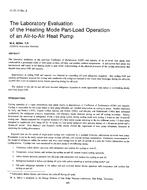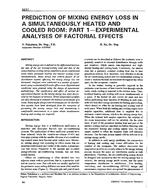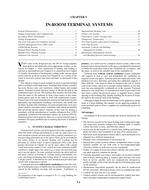This systems analysis complements the experimental results obtained at the American Gas Association laboratories on the influence of derating on furnace corrosion and the fuel savings determined for a number of field tests of the Gas Industry’s Seasonal Heating Efficiency Improvement Program (SHElP).
The following items were discussed in this paper:
— Review of the HFLAME model, with description of the performance of a typical heating system.
— Oversize:
1. New equipment of lower oversize, but of otherwise equal design and performance saves little operating cost (1-2% per 20% reduction in oversize) and may reduce night setback savings.
2. Derating old equipment reduces operating cost at the expense of generally shorter heat exchanger life due to increased corrosion. Optimum efficiencies for maximum life cycle cost savings have been computed and depend on ratio of operating/equipment costs.
— Stack Dampers: The large range of fuel savings obtained with stack dampers result from the combined influence of climate, oversize, location of furnace, damper characteristics, heat exchanger mass, controls set points, steady state efficiency, etc.
— HFLAME studies provided insight on reasons for lab and field energy saving results and showed good correlation with furnace corrosion data from AGA Labs and retrofit field data from SHElP. In addition, the studies showed that cost savings may be smaller than fuel savings in cases where the furnace is derated, but are about equal to the fuel savings if the improvement is achieved without changing the fan control setting or the firing rate.
Citation: ASHRAE Transactions, Volume 86, Part 1, Los Angeles, California
Product Details
- Published:
- 1980
- Number of Pages:
- 28
- File Size:
- 1 file , 2.5 MB
- Product Code(s):
- D-LA-2580


